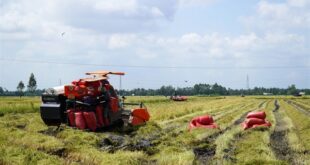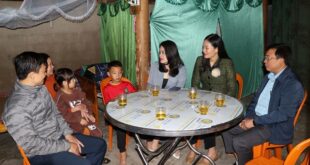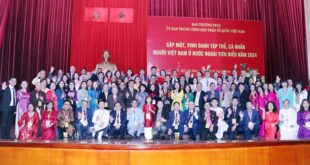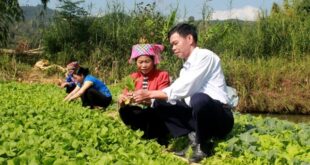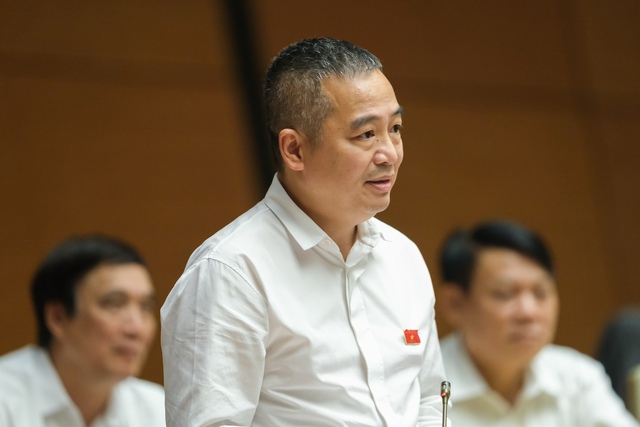
HÀ NỘI — National Assembly deputies on Wednesday discussed the implementation of socio-economic development plans and the State’s budget for last year and the first five months of this year.
As the COVID-19 pandemic in Việt Nam has been properly controlled, the country has seen positive recoveries with a stable macroeconomy, controlled inflation and recovering production and business. However, deputies are still concerned about pending issues and have urged for stronger practical actions.
Deputy Nguyễn Lân Hiếu from An Giang Province said that the COVID-19 pandemic is entering a receding stage, so close monitoring and flexible responses are needed for the new normal.
It is necessary to avoid overloading the health system so that hospitals have enough capacity to treat common diseases besides COVID-19.
However, he also expressed concern that, after the pandemic, many problems remain in Việt Nam’s health sector.
“To solve the problems, first, it’s necessary to review, develop and finalise the revised draft Law on Medical Examination and Treatment so that it could be passed soon,” he said.
The Government also needs to soon issue key decrees and circulars to remove serious problems with the health system, such as reducing the level of the COVID-19 pandemic, the settlement of anti-epidemic costs and health insurance payment for grassroots health care or high-tech investment in specialised hospitals.
Hiếu also emphasised the need to have a training policy to improve quality and attract talented human resources, which is extremely difficult for the health sector today.
Deputy Trần Hoàng Ngân from HCM City said that according to the General Statistics Office, there were many positive spots in the socio-economic situation in the first five months of the year. For example, the industrial production index continued to increase by 8.3 per cent, and total retail sales of consumer goods and services increased by 9.7 per cent.
This is the eighth year Việt Nam has controlled inflation below 4 per cent. On May 26, 2022, the Global Credit Rating Agency upgraded Việt Nam’s national credit rating from BB to BB+ with a stable outlook, recording its strong economic recovery.
“However, the business situation of Vietnamese enterprises, especially small and medium enterprises, is facing many challenges. The lives of workers, people and the poor are facing many difficulties due to the high price of petrol and some other commodities,” Ngân said.
“The world context is complicated, geopolitical tensions are increasing, and it is not favourable for a country with a large economic openness like Việt Nam,” he said.
So far, major countries have implemented tight monetary policies and raised interest rates, affecting the world economic recovery, he added.
To achieve the goal of economic growth of 6 to 6.5 per cent and inflation control of 4 per cent in 2022, the Government needs to build a system of solutions in the short, medium and long term.
For the short term, it is important to take into account two variables – petrol and food prices, Ngân said.
In the immediate future, priority should be given to stabilising the macro-economy, controlling inflation, and ensuring social security. Accordingly, the Government should submit to the National Assembly and the National Assembly Standing Committee to reduce environmental protection taxes, special consumption taxes, and value-added taxes on commodities, of which the most important ones are petroleum products, he said.
This is also needed to help to reduce input costs for businesses and strengthen inspection, price control and anti-speculation, he said, recommending that price stabilisation programmes should be implemented in localities, industrial parks and export processing zones.
Ngân also called for accelerating the development of mechanical, material and supporting industries, speeding up digital transformation for the digital economy, supporting businesses in digital transformation and investing more in Việt Nam’s agriculture industry, as it is a strength of Việt Nam while other countries around the world are facing a food crisis.
Deputy Lý Tiết Hạnh from Bình Định Province said that the stock and capital market in Việt Nam had certain development. However, there have been a number of cases and unhealthy manifestations in the stock and bond markets, such as market manipulation, information hiding, and profiteering, which affected credit safety and safety of the country’s finance.
She suggested the Government continue to thoroughly solve these problems. Specifically, ministries and branches need to review the provisions of the law on securities and corporate stock issuance and strictly manage the issuance of private corporate shares by amending the Law on Securities and the Law on Enterprises, as well as relevant decrees.
Nguyễn Duy Minh from Đà Nẵng City urged the Government to pay more attention to the sharp increase in exports, but the contribution of the FDI sector is still the largest in the trade structure of Việt Nam
“In 2021, FDI contributed 74 per cent of total export turnover. This reflects that exports are highly dependent on the foreign-invested economic sector but is also creating many uncertainties and potentials for the economy,” he said.
“The export market share and the proportion of most key products are carried out by FDI enterprises. This reflects the limited competitiveness of domestic enterprises and the lack of linkage between domestic enterprises and FDI enterprises,” he said.
Therefore, the Government needs to encourage domestic enterprises to expand their business, especially in the manufacturing and high-tech fields to strengthen the domestic industrial base, improve the quality of human resources, and encourage FDI enterprises to use high-quality Vietnamese labour, he said.
Referring to the tourism sector, the deputy suggested the Government and ministries better evaluate the results of the implementation of support policies for businesses and workers affected by the COVID-19 pandemic, in which it is necessary to clarify the obstacles, limitations and causes to propose solutions to overcome.
At the same time, it is necessary to have policies to promote tourism abroad, policies to encourage investment, and support the development of the night-time economy, cultural industry, and creative industry associated with tourism, he said. — VNS
- Reduce Hair Loss with PURA D’OR Gold Label Shampoo
- Castor Oil Has Made a “Huge” Difference With Hair and Brow Growth
- Excessive hair loss in men: Signs of illness that cannot be subjective
- Dịch Vụ SEO Website ở Los Angeles, CA: đưa trang web doanh nghiệp bạn lên top Google
- Nails Salon Sierra Madre
 VnExpress News The News Gateway of Vietnam
VnExpress News The News Gateway of Vietnam
